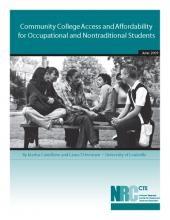Community College Access and Affordability for Occupational and Non-Traditional Student
 The purpose of this study was to
examine what types of initiatives exist to increase access to and
affordability of postsecondary education, especially in community
college programs that lead to occupational advancement. We
reviewed community college agency and state legislative Web sites
to discover what initiatives or policies are currently being
implemented or considered in the 50 states. We found few
state-level initiatives designed specifically for occupational
students, so we broadened our target population to include
nontraditional students, whom we defined as financially
independent working adults (over 25) who commute to a community
college part time. We found that common ways of attempting to
increase access for nontraditional students were (1) evening and
weekend course schedules, (2) distance learning, and (3)
awareness campaigns about college and the availability of
financial aid. In terms of affordability, we found that states
were expanding existing financial aid programs as well as
creating new ones that target nontraditional students. States
were also targeting specific occupational fields for aid in order
to develop the workforce needed in that state. Future research in
this area should study the effectiveness of these initiatives and
policies in order to determine which initiatives have had the
greatest impact on increasing access to and affordability of
community colleges for occupational and nontraditional students.
The purpose of this study was to
examine what types of initiatives exist to increase access to and
affordability of postsecondary education, especially in community
college programs that lead to occupational advancement. We
reviewed community college agency and state legislative Web sites
to discover what initiatives or policies are currently being
implemented or considered in the 50 states. We found few
state-level initiatives designed specifically for occupational
students, so we broadened our target population to include
nontraditional students, whom we defined as financially
independent working adults (over 25) who commute to a community
college part time. We found that common ways of attempting to
increase access for nontraditional students were (1) evening and
weekend course schedules, (2) distance learning, and (3)
awareness campaigns about college and the availability of
financial aid. In terms of affordability, we found that states
were expanding existing financial aid programs as well as
creating new ones that target nontraditional students. States
were also targeting specific occupational fields for aid in order
to develop the workforce needed in that state. Future research in
this area should study the effectiveness of these initiatives and
policies in order to determine which initiatives have had the
greatest impact on increasing access to and affordability of
community colleges for occupational and nontraditional students.
Castellano, M., & Overman, L. T. (2009, June). Community college access and affordability for occupational and non-traditional students. Louisville, KY: National Research Center for Career and Technical Education, University of Louisville.

